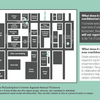What is Interpersonal Violence (IPV)?
Interpersonal Violence (or IPV) may be a term that is new to some. At the WRC, we use this as an umbrella term referring to experiences of sexual assault, stalking, sexual harassment, and relationship abuse. Interpersonal violence includes a range of experiences and behaviors - across the lifespan - that are rooted in power and control. Systems of oppression and forms of inequity are the roots of all forms of interpersonal violence. IPV stems from systems that uphold racism, sexism, homophobia, transphobia, ableism, xenophobia, etc.; therefore, our work must take an intersectional and anti-oppression approach.
The WRC’s Violence Prevention Work
The WRC is a resource on campus dedicated to preventing interpersonal violence through awareness and education in addition to building relationships across campus to ensure all students have access to support services and can get involved with prevention efforts. Some examples of the WRC’s work include:
Educational programs focused on consent, healthy relationships, supporting peers and intervening, and more. Request a program for your community, class, org, etc.!
Events and initiatives to raise awareness about IPV/prevention such as the Clothesline Project and WalkTU.
Support of peer education and student involvement in anti-violence work through the HEART Peer Education program.
Partnerships and collaborations across the university.
Education and awareness building through social media (@BeWellTU).
Supporting Your Peers
Violence is preventable, and everyone in our community has a role to play in working towards a campus free from harm. Prevention starts with positive social change and creating community.
You can support a peer who has experienced violence through V-A-R:
Validate their feelings: Let them know what they are feeling is ok and that you believe them. Validation sounds like: “That makes sense.” or “I’m sorry you are struggling right now.”
Appreciate their vulnerability and courage: Sharing a difficult experience can be a challenging step. Show you’re there to support them. Affirmation sounds like, “It helps to know what you’re going through so I can be there for you.” or “Thank you for trusting me with this. I’m glad you told me.”
Refer them to support and resources: Support them in figuring out what would be most helpful to them and let them know that help is available. Refer sounds like, “Sometimes people find it helpful to talk to someone, can I share a resource with you?” or “What would be most helpful in this moment?”
As a community, we can work to create an environment that doesn’t condone violence and instead nurtures respect and consent.



